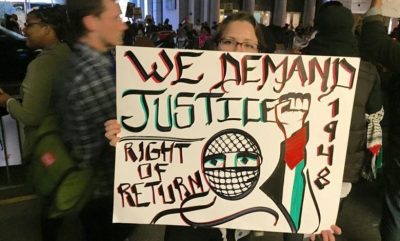Palestinians Face Existential Threat. Palestine Transformed Into “Surveilled Open Air Prison”
Human Rights Council

All Global Research articles can be read in 51 languages by activating the Translate Website button below the author’s name.
To receive Global Research’s Daily Newsletter (selected articles), click here.
Click the share button above to email/forward this article to your friends and colleagues. Follow us on Instagram and Twitter and subscribe to our Telegram Channel. Feel free to repost and share widely Global Research articles.
***
The Human Rights Council this afternoon held an interactive dialogue with the Special Rapporteur on the situation of human rights in the Palestinian territory occupied since 1967 on her report on arbitrary deprivation of liberty. It also started an interactive dialogue with the Special Rapporteur on racism, racial discrimination, xenophobia, and related forms of intolerance on her reports on increasing efforts to implement international legal provisions providing protection from racism, racial discrimination, xenophobia and related intolerance, and on combatting the glorification of Nazism, neo-Nazism and related ideologies.
Francesca Albanese, Special Rapporteur on the situation of human rights in the Palestinian territory occupied since 1967, presenting her report on arbitrary deprivation of liberty, said since 1967, Israel had detained approximately one million Palestinians in the occupied territory, including tens of thousands of children. Currently, there were 5,000 Palestinians in Israeli prisons, including 160 children, and approximately 1,100 of them were detained without charge or trial.
The Special Rapporteur said the occupied Palestinian territory had been transformed as a whole into a constantly surveilled open-air prison. The occupying power framed the Palestinians as a collective incarcerable security threat, ultimately de-civilianising them, namely eroding their status as protected persons. Israel’s unlawful carceral practices were tantamount to international crimes which warranted an urgent investigation by the Prosecutor of the International Criminal Court. All the more as these offences appeared to be part of a plan of ‘de-Palestinisation’ of the territory. This threatened the existence of a people as a national cohesive group.
*
Report of the Special Rapporteur on the situation of human rights in the Palestinian territories occupied since 1967, Francesca Albanese
By Human Rights Council, Fifty-third session
19 June – 14 July 2023
Summary
In the present report, the Special Rapporteur on the situation of human rights in the Palestinian territories occupied since 1967, Francesca Albanese, finds that arbitrary and deliberate ill-treatment is inflicted upon the Palestinians not only through unlawful practices in detention but also as a carceral continuum comprised of techniques of large-scale confinement – physical, bureaucratic, digital – beyond detention. These violations may amount to international crimes prosecutable under the Rome Statute of the International Criminal Court and universal jurisdiction. Israel’s occupation has been a tool of settler colonial conquest also through intensifying methods of confinement against an entire people who – as any people would – continuously rebel against their prison wardens.
Introduction
1. In this report, Francesca Albanese, the Special Rapporteur on the situation of human rights in the Palestinian territories occupied since 1967, presents concerns related to the widespread and systematic arbitrary deprivation of liberty in the occupied Palestinian territory.
2. Despite being invited by the State of Palestine, the Special Rapporteur was unable to visit the occupied Palestinian territory before submitting this report due to Israel’s continued refusal to facilitate her entry. She conducted a remote investigation over six months, including a visit to Jordan, and virtual meetings and tours in the occupied Palestinian territory.1 The report draws upon these consultations, testimonies, stakeholders’ contributions, and a comprehensive review of primary and public sources.
3. A 10,700-word report cannot capture the scale and extent of the arbitrary deprivation of liberty in the occupied Palestinian territory. Nor can it convey the suffering of millions of Palestinians who have, directly or indirectly, been affected. The report provides a bird’s-eye view of arbitrary deprivation of liberty as a key instrument of Israel’s domination and oppression, addressing primarily structural issues and scale of the phenomenon.2 International law violations by Palestinian authorities are assessed to the extent they contribute to tightening the grip of the regime imposed by the occupation.
4. The report clarifies circumstances, norms and processes that lead to arbitrary deprivation of Palestinians’ liberty. The reality captured is of an entire occupied population framed as a security threat, often presumed guilty, and punished with incarceration even when trying to exercise fundamental freedoms. This system presents features of persecution, which often involves ill-treatment behind bars and surveillance out of prison. While in-prison confinement is the most acute form of deprivation of liberty imposed on Palestinians, physical, bureaucratic and digital ‘architectures’ further restrict them spatially and psychologically. This wider carcerality, made of an array of laws, procedures and techniques of coercive confinement, transforms the occupied Palestinian territory into a constantly surveilled open-air pan opticon.
5. An examination of this carceral continuum – a system of control composed of multiple and interrelated levels of confinement – underscores the urgency to end it, as required by international law, and ensure both accountability for the architects of its most serious violations and reparations for the victims.
Click here to read the full report.
*
Note to readers: Please click the share button above. Follow us on Instagram and Twitter and subscribe to our Telegram Channel. Feel free to repost and share widely Global Research articles.

